

Second Fox News reporter leaves amid objections to network. Another on-air reporter is leaving Fox News over frustrations with the direction and tone of the network, the second in the last three weeks to defect for those reasons.
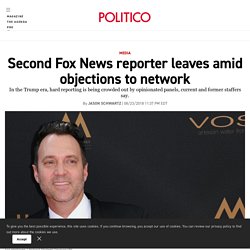
Adam Housley, a Los Angeles-based reporter who joined Fox in 2001, felt there was diminished opportunity at the network for reporters and disapproved of tenor of its on-air discussion, according to two former Fox News employees with knowledge of his situation. Story Continued Below. Americans — especially but not exclusively Trump voters — believe crazy, wrong things. Republican presidential nominee Donald Trump believes there's a global conspiracy to stop him from becoming president – but it's not the first time he's pushed unfounded theories.
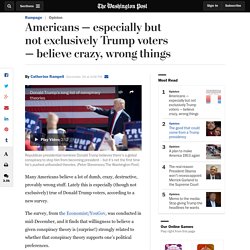
(Peter Stevenson/The Washington Post) Republican presidential nominee Donald Trump believes there's a global conspiracy to stop him from becoming president – but it's not the first time he's pushed unfounded theories. Donald Trump's long list of conspiracy theories (Peter Stevenson/The Washington Post) Many Americans believe a lot of dumb, crazy, destructive, provably wrong stuff. Lately this is especially (though not exclusively) true of Donald Trump voters, according to a new survey. The survey, from the Economist/YouGov, was conducted in mid-December, and it finds that willingness to believe a given conspiracy theory is (surprise!)
Evangelicals, your attacks on ‘the media’ are getting dangerous. How Republicans Deregulated The FCC and Gave Corporations Control Of the Media. The concept of a free press and its direct relationship to a free people has been a foundational underpinning of American democracy since the nation’s founding, and for 227 years that simple premise held true.
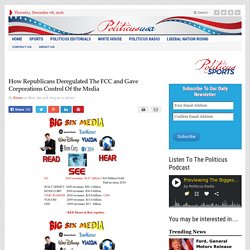
Founding Father Thomas Jefferson famously said “The only security of all is in a free press. State of the News Media 2016. Traits and habits of U.S. news consumers: 5 key findings. Twenty years ago, only 12% of U.S. adults got news online.
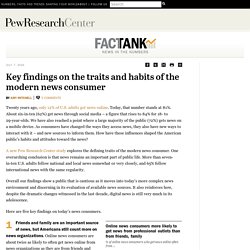
Today, that number stands at 81%. About six-in-ten (62%) get news through social media – a figure that rises to 84% for 18- to 29-year-olds. We have also reached a point where a large majority of the public (72%) gets news on a mobile device. As consumers have changed the ways they access news, they also have new ways to interact with it – and new sources to inform them. Recognizing and Rejecting Patterns of Deception - Politics. During the 2012 election, FlackCheck.org flagged two different kinds of recurrent deceptions to put candidates on notice and increase public understanding of the substance of presidential campaigns.
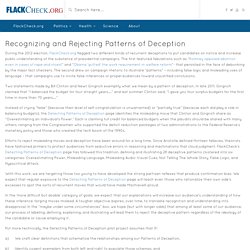
The first featured fabulations such as “Romney opposed abortion even in cases of rape and incest” and “Obama ‘gutted’ the work requirement in welfare reform“- that persisted in the face of debunking by the major fact checkers. The second drew on campaign rhetoric to illustrate “patterns” – including false logic and misleading uses of language – that campaigns use to invite false inferences or propel audiences toward unjustified conclusions.
Two statements made by Bill Clinton and Newt Gingrich exemplify what we mean by a pattern of deception. In late 2011, Gingrich claimed that “I balanced the budget for four straight years…” and last summer Clinton said, “I gave you four surplus budgets for the first time in more than 70 years…” Patterns of Deception - Politics. Welcome to FlackCheck.org’s Detecting Patterns of Deception, the beta version of a new page designed to help viewers spot and debunk slippery moves in politics.
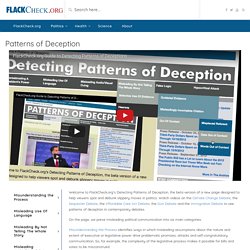
Watch videos on the Climate Change Debate, the Sequester Debate, the Affordable Care Act Debate, the Gun Debate and the Immigration Debate to see patterns of deception in contemporary debates. On the page, we parse misleading political communication into six main categories. Misunderstanding the Process identifies ways in which misleading assumptions about the nature and extent of executive or legislative power drive problematic promises, attacks and self-congratulatory communication. Negative political ads and voter effects: Research roundup. Many people have a visceral reaction to political attack ads on TV: Not much will prompt a faster change of the channel.

But they are difficult to escape during election season and it is doubtful that the 2016 presidential election season will be much different. Political ads became much more negative over the course of the 2012 presidential campaign. Erika Franklin Fowler, an assistant professor of government, noted that 2012 will likely be remembered for its record-setting negativity. Fowler directs The Wesleyan Media Project, which monitors and analyzes televised campaign ads and found that three-quarters of ads aired during the last presidential race “appealed to anger.”
A December 2015 report the project released suggests that the 2016 election season had not, at that point, taken an ugly turn — at least not via TV ads. How the Media Inspires Mass Shooters. In late August, not 10 hours after a disgruntled former TV reporter posted video on Twitter and Facebook of himself gunning down two ex-colleagues in Virginia, the New York Daily News tweeted a preview of its front page for the next day.
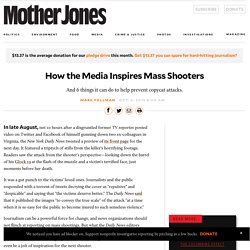
Traits and habits of U.S. news consumers: 5 key findings. The Mass Media and the Public's Assessments of Presidential Candidates, 1952–2000 - Gilens - 2007 - Journal of Politics. Negative political ads and voter effects: Research roundup. State of the News Media 2016.